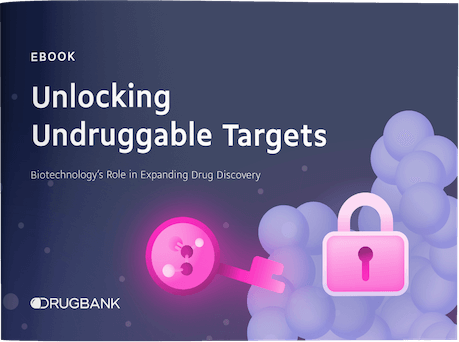Explore a selection of our essential drug information below, or:
Identification
- Generic Name
- AC-100
- DrugBank Accession Number
- DB05671
- Background
AC-100 is a novel synthetic peptide derived from an endogenous human protein produced by bone and dental cells (a fragment from matrix extracellular phosphoglycoprotein). It is being developed by Acologix, Inc.
- Type
- Biotech
- Groups
- Investigational
- Biologic Classification
- Protein Based Therapies
Other protein based therapies - Protein Chemical Formula
- Not Available
- Protein Average Weight
- Not Available
- Sequences
>Matrix extracellular phosphoglycoprotein (242-264) TDLQERGDNDISPFSGDGQPFKD
Download FASTA Format- Synonyms
- Not Available
Pharmacology
- Indication
Investigated for use/treatment in periodontal disease.
 Reduce drug development failure ratesBuild, train, & validate machine-learning modelswith evidence-based and structured datasets.Build, train, & validate predictive machine-learning models with structured datasets.
Reduce drug development failure ratesBuild, train, & validate machine-learning modelswith evidence-based and structured datasets.Build, train, & validate predictive machine-learning models with structured datasets.- Contraindications & Blackbox Warnings
 Prevent Adverse Drug Events TodayTap into our Clinical API for life-saving information on contraindications & blackbox warnings, population restrictions, harmful risks, & more.Avoid life-threatening adverse drug events with our Clinical API
Prevent Adverse Drug Events TodayTap into our Clinical API for life-saving information on contraindications & blackbox warnings, population restrictions, harmful risks, & more.Avoid life-threatening adverse drug events with our Clinical API- Pharmacodynamics
In animal models, AC-100 promoted cartilage regeneration. In the study, goats with an osteochondral femoral condylar (knee cartilage) defect were used to evaluate the effects of AC-100 on cartilage regeneration. Cylindrical defects were created in the knee cartilage and were filled with a collagen sponge containing AC-100 at two different doses or a collagen sponge soaked in saline (control group). Post-operative treatments included intra-articular injections of the test articles into the operated knee joint at weeks one, two and three post surgery. Cartilage regeneration was evaluated in one group after 84 days and 168 days in another group. The results demonstrated that the application of AC-100 dose dependently promoted cartilage defect repair. The groups treated with the higher dosage of AC-100 had greater healing outcome scores than the saline control groups. As there was no evidence of an inflammatory response, AC-100 demonstrated a favorable safety profile in the study.
- Mechanism of action
In several preclinical models, AC-100 has demonstrated potent and selective dental tissue and bone formation activity, however the exact mechanism is not known. One study (PMID:15153459) showed that AC-100 enhances dental pulp stem cell (DPSC) proliferation by down-regulating P16, accompanied by up-regulation of ubiquitin protein ligase E3A and human ubiquitin-related protein SUMO-1. Enhanced cell proliferation required intact RGD and SGDG motifs in the peptide. This study shows that AC-100 can promote DPSC proliferation, with a potential role in pulp repair.
- Absorption
Not Available
- Volume of distribution
Not Available
- Protein binding
Not Available
- Metabolism
- Not Available
- Route of elimination
Not Available
- Half-life
Not Available
- Clearance
Not Available
- Adverse Effects
 Improve decision support & research outcomesWith structured adverse effects data, including: blackbox warnings, adverse reactions, warning & precautions, & incidence rates. View sample adverse effects data in our new Data Library!Improve decision support & research outcomes with our structured adverse effects data.
Improve decision support & research outcomesWith structured adverse effects data, including: blackbox warnings, adverse reactions, warning & precautions, & incidence rates. View sample adverse effects data in our new Data Library!Improve decision support & research outcomes with our structured adverse effects data.- Toxicity
Not Available
- Pathways
- Not Available
- Pharmacogenomic Effects/ADRs
- Not Available
Interactions
- Drug Interactions
- This information should not be interpreted without the help of a healthcare provider. If you believe you are experiencing an interaction, contact a healthcare provider immediately. The absence of an interaction does not necessarily mean no interactions exist.Not Available
- Food Interactions
- Not Available
Products
 Drug product information from 10+ global regionsOur datasets provide approved product information including:dosage, form, labeller, route of administration, and marketing period.Access drug product information from over 10 global regions.
Drug product information from 10+ global regionsOur datasets provide approved product information including:dosage, form, labeller, route of administration, and marketing period.Access drug product information from over 10 global regions.- International/Other Brands
- Dentonin
Categories
- Drug Categories
- Not Available
- Chemical TaxonomyProvided by Classyfire
- Description
- Not Available
- Kingdom
- Organic Compounds
- Super Class
- Organic Acids
- Class
- Carboxylic Acids and Derivatives
- Sub Class
- Amino Acids, Peptides, and Analogues
- Direct Parent
- Peptides
- Alternative Parents
- Not Available
- Substituents
- Not Available
- Molecular Framework
- Not Available
- External Descriptors
- Not Available
- Affected organisms
- Humans and other mammals
Chemical Identifiers
- UNII
- 513T9QRH4D
- CAS number
- Not Available
References
- General References
- Goldberg M, Lacerda-Pinheiro S, Jegat N, Six N, Septier D, Priam F, Bonnefoix M, Tompkins K, Chardin H, Denbesten P, Veis A, Poliard A: The impact of bioactive molecules to stimulate tooth repair and regeneration as part of restorative dentistry. Dent Clin North Am. 2006 Apr;50(2):277-98, x. [Article]
- Hayashibara T, Hiraga T, Yi B, Nomizu M, Kumagai Y, Nishimura R, Yoneda T: A synthetic peptide fragment of human MEPE stimulates new bone formation in vitro and in vivo. J Bone Miner Res. 2004 Mar;19(3):455-62. Epub 2003 Dec 29. [Article]
- Liu H, Li W, Gao C, Kumagai Y, Blacher RW, DenBesten PK: Dentonin, a fragment of MEPE, enhanced dental pulp stem cell proliferation. J Dent Res. 2004 Jun;83(6):496-9. [Article]
- External Links
- PubChem Substance
- 347910188
Clinical Trials
- Clinical Trials
Clinical Trial & Rare Diseases Add-on Data Package
Explore 4,000+ rare diseases, orphan drugs & condition pairs, clinical trial why stopped data, & more. Preview package Phase Status Purpose Conditions Count Start Date Why Stopped 100+ additional columns Unlock 175K+ rows when you subscribe.View sample data
Pharmacoeconomics
- Manufacturers
- Not Available
- Packagers
- Not Available
- Dosage Forms
- Not Available
- Prices
- Not Available
- Patents
- Not Available
Properties
- State
- Solid
- Experimental Properties
- Not Available
Drug created at November 18, 2007 18:26 / Updated at June 12, 2020 16:52


